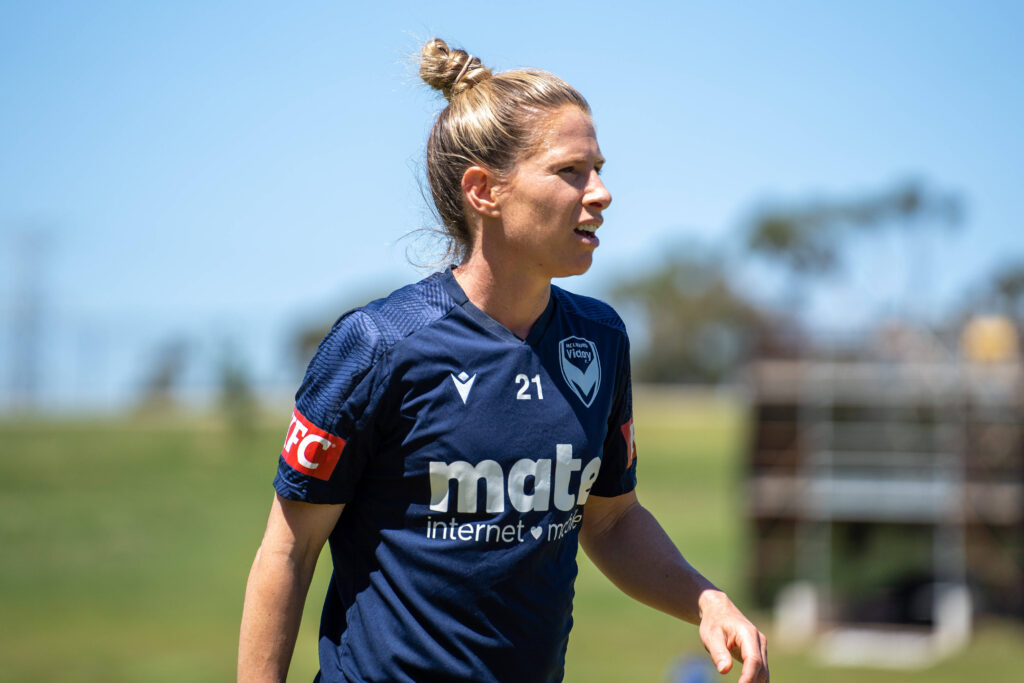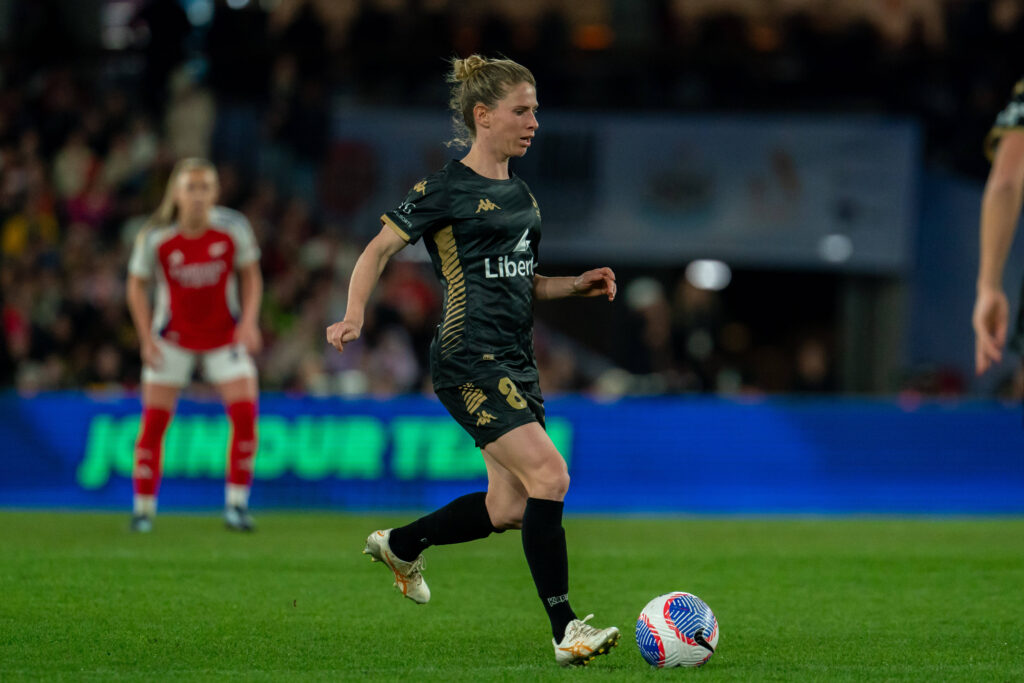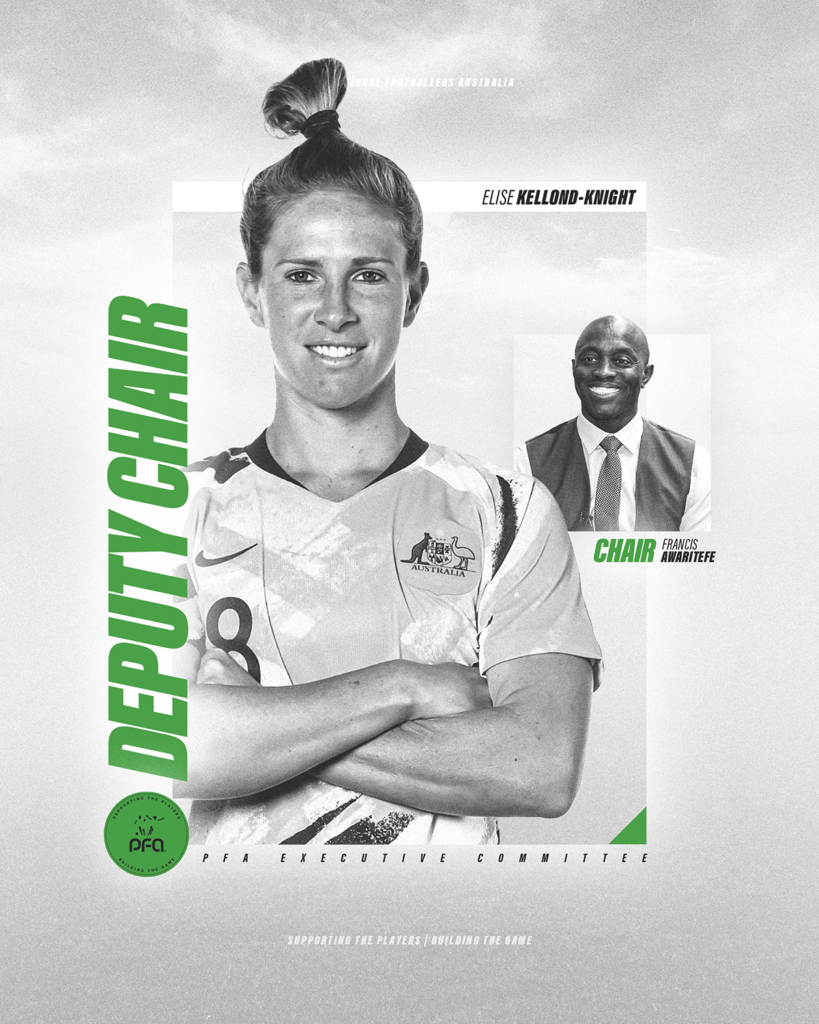After being appointed Professional Footballers Australia’s Deputy Chair, former Matilda and A-Leagues legend Elise Kellond-Knight discusses her new role and how she hopes to continue taking the game forward.
Featured image: IMAGO / Sports Press Photo
Q: Tell us what it means to be elected into the new role?
Kellond-Knight: “It’s an honour. I know it’s a cliche word, but it’s nice to be recognised, respected and offered the role.
“It’s the first time we’ve had this role. We’ve never had a deputy chair before. I think it’s a privilege to be able to step up into a leadership role and work with Francis (Awaritefe) to lead the (PFA) Executive over the next period of time, because we’re going into an important period with CBA (Collective Bargaining Agreement) negotiations for both the A-Leagues and the senior national teams.”
Read more: Professional Footballers Australia announces new leadership appointments
Q: What will your new role entail?
KK: “It’s a leadership role involved in setting the PFA’s strategy. Being a part of the Executive was more around governance, player input and player voice. I was obviously able to have input at times, but it was less about monthly meetings strategising how the organisation is going to run, so I think that’ll be the level of difference.
“It’s a massive loss for us that [former Deputy Chief Executive] Kate Gill stood down. So I think it’s really important that we’ve got other females ready to step up and keep knocking on that door, because it’s really important to have female leadership in that space, and the PFA obviously recognise that.
“That’s why they’ve promoted Meeks (Tameka Yallop) and myself into leadership roles.”

Q: What has your experiences been with the PFA throughout your career?
KK: “I’ve been involved with the Executive for the majority of my career. I actually got invited when I was very young in my early 20s. [Former Matilda] Sarah Walsh actually identified me as having some logical thinking skills. She really wanted to get some younger players involved in the union and have some develop leadership skills amongst the younger crop of players.
“So since that time I remained on the Executive because it’s been the only way that we’ve been able to make positive change for women’s sports. When I started, [the women’s game] was very much at an amateur level, and we were fighting for basic conditions such as getting our laundry done and just receiving any sort of compensation to make our lives a little bit more manageable, particularly splitting football and work.
“At that point, we were negotiating quite simple things and as my time with the union progressed, I didn’t foresee having such a vital role. I really joined the Executive as a chance to learn, develop my own personal leadership skills and basically understand more about the governance of football.
“It gave me an understanding why certain things happened and maybe why we didn’t get equal treatment as females in the game. So that was really enlightening in my early years, and then as it progressed, I actually played quite a pivotal role through the years around 2015 to 2019 where we actually progressed the women’s game significantly.
“We had one of our biggest wins in 2015 when we went on strike and finally got recognised and given, I wouldn’t say adequate conditions, but conditions that at least allowed us to continue to play football. I wouldn’t say we reached a professional level in the game yet.
“Then over those next four years, we really built some great momentum and strategies. In 2019, we finally got that pay equality. So it’s been an awesome journey that I’ve had with the union and I think my interest to stay involved purely to progress the game again, because I’ve been a part of this movement it seems like a shame to step aside even if I’m not playing professionally in the game anymore.
“I still want the game to continue to progress, and I’m still going to fight for conditions to improve the female game and for me that sits in the A-League space. In my own personal experience last year I was forced to retire because the conditions just weren’t good enough anymore to allow me to play, and I don’t want that to happen to anyone else, so I’m going to use my knowledge and experience and new position to help progress and create positive change.”

Q: In terms of professionalising the A-League Women’s competition, how important is continuing to pressure decision-makers to ensure it’s something that happens sooner rather than later?
KK: “Whoever asks me about a timeframe, I say yesterday. It should have happened yesterday. We should have had a full time professional league yesterday. It needs to happen.
“We need to keep pushing boundaries, and we need to keep knocking on the door, because it won’t happen miraculously. We need intelligent minds and really good strategies. I’m keen to be a part of those discussions and in this new role as Deputy Chair, I get to have these discussions at a higher level, and even strategise with the union in how we can finally make this happen.”
Q: What else can been done beyond just full-time contracts?
KK: “Everything [can improve]. We’re always striving to improve. I don’t think we’re at an adequate level. We cannot be comfortable in any area of the game. We’ve always got to be looking to improve.
“But things that stick out in my mind are fan engagement, I think it needs massive improvement. Infrastructure as well, getting the games in suitable venues. There’s no easy solution. That’s why it hasn’t happened.
“So we need some creative minds and some really good strategies and ideas on how we can make it better for that fan experience.
“When you improve the fan experience, more people engage with the game and then it flows into the business model. I think that’s probably another key area, and the benefit needs to flow into the players, where they can finally have adequate conditions to live and play.
“You need to just give players the opportunity to train. You take away all the distractions, you give them support they need, and they can suddenly play at a higher level. It’s definitely going to happen in the women’s game as well.”
Q: What is your ideal vision for the A-League Women?
KK: “It just needs to be full time pro.
“When I say full time pro, it’s not million dollar wages, it’s a liveable wage, it’s a 12 month contract. It’s an adequate competition, so enough teams in there to make it into a competition, and then the infrastructure around it, so everyone’s training environment and where the games are being played, and you can tie that into a broadcast too.
“It needs to be a product that fans want to engage with, so that needs to improve.”
Q: Working with Tameka Yallop (new PFA Co-President) in this new role. How excited are you to work alongside her?
KK: “We probably wouldn’t have dreamt of this, when we were 12 year olds playing together!
“I think we’re both motivated by the same thing, that we want to improve the game and get it to a level that we wish we had as kids.
“So we’re very selfless individuals, and I think where we share a lot of similar values and they align to the PFA too. I think we’re two people that are not self driven but driven by improving the game and I think that’s hopefully going to show in the work that we can do in this space.”








